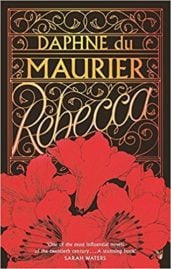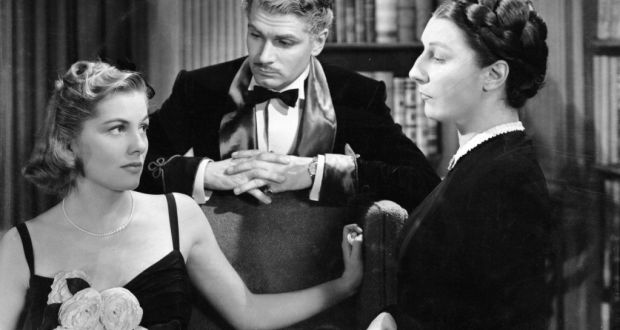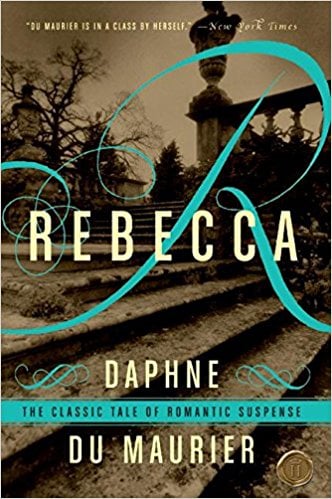Rebecca – Daphne du Maurier’s 1938 Masterpiece
By Taylor Jasmine | On October 6, 2018 | Updated May 13, 2024 | Comments (4)

Rebecca by Daphne du Maurier, published in 1938, is arguably the most iconic of the prolific British author’s novels. During the British author’s lifetime, critics frequently dismissed her work because it was popular with the public — readable and riveting. That view has since been revised.
Rebecca celebrated its eightieth anniversary of publication in 2018, never having gone out of print. It was an immediate bestseller upon publication, selling more than a million copies in hardcover in a short time. It has been reprinted countless times, and translated into numerous languages.
In 1940, just two years after its publication, it was released as an Academy Award-winning film directed by Alfred Hitchcock. Appropriately creepy and intense, yet oddly romantic, the screen version starring Joan Fontaine and Laurence Olivier captured the emotional tenor of the book.
But it left out one key detail (which we won’t go into here), which makes the book a must-read before you even consider seeing the film. At least two miniseries have been made from the novel since — but the novel is still best!
Inspired by Jane Eyre
Du Maurier was something of an expert on the Brontë family. So the hypothesis that Rebecca was inspired by Charlotte Brontë‘s Jane Eyre rings true.
The gothic atmosphere of a castle-like estate and a brooding, secretive husband with a troubled first marriage are elements that the two books have in common. But they diverge in important ways.
While the character of Jane Eyre is feisty and independent, the nameless narrator in Rebecca is shy and diffident. The story is cleverly told in the first person by this awkward young bride of the older, mysterious Maxim de Winter. She is, like the other inhabitants of Manderley castle, haunted by the shadow by her husband’s deceased first wife, Rebecca.
. . . . . . . . . .

You might also like: Rebecca — 1940 Movie
. . . . . . . . . .
Mixed reviews give way to praise
Though the book initially received many accolades upon initial publication, many reviews, like the one in the The Times of London Literary Supplement in August of 1938:
“‘Rebecca’ is a lowbrow story with a middlebrow finish. As such it squares with a formula for novel-writing that yields handsome results several times in the year.
If one chooses to read the book in a critical fashion – but only a tiresome reviewer is likely to do that – it becomes an obligation to take off one’s hat to Miss du Maurier for the skill and assurance with which she sustains a highly improbable fiction.
Whatever else she may lack, it is not the story-teller’s flow of fancy. All things considered, this is an ingenious, exciting and engagingly romantic tale.”
Other reviewers dismissed it as “women’s fiction,” or mere gothic romance. But with the benefit of decades of perspective, Rebecca is acknowledged as a masterpiece psychological thriller. In a 2017 article in The Telegraph, Tammy Cohen encapsulated why du Maurier has been such an influence on those who came after her. On Rebecca, she writes:
“Only on re-reading some years later did I pick up on the subtler joys of the book: the compelling, dreamlike writing, the brooding sense of place, the growing menace which creeps up on you so slowly it’s like looking up from an engrossing book to find the sky outside has darkened and the radiator long since grown cold … in many ways Daphne du Maurier was the architect of modern domestic noir.”
From its iconic first line — “Last night I dreamt I went to Manderley again” — to its last suspenseful twist, Rebecca has kept readers riveted for decades. It’s a window into the best and worst of human nature, and a complex portrait of love and jealousy, leaving the reader to wonder: what would we do, and how would we feel in the nameless narrator’s place?
. . . . . . . . . .

Du Maurier’s Rebecca: A Worthy “Eyre” Apparent
. . . . . . . . .
Following is a deservedly kind review from the time of the book’s publication that is careful not to give anything away:
A 1938 review of Rebecca
A review of Rebecca by Daphne du Maurier, originally published in The Lincoln (NE) Daily Star, December 1938:
Jane Eyre will be the first and inevitable comparison of those who read this thick, rich, fast, and lively melodrama of a heroine whose name is never given, who considers herself unattractive, but who never becomes more definite about that beauty or lack of it.
Sensational incidents cumulate in two climaxes without the slightest letdown, and chafe the imagination with hints for well over 300 pages, but never come through with facts.
Illness of the vulgar Mrs. Van Hopper left the self-conscious, shy, diffident, and lonely child who was her companion temporarily adrift in Monte Carlo. She was amazed when Maxim de Winter, twice her age, carrying a tragic history in the recent death of his wife Rebecca, fleeing from the memories of the beautiful Manderley, asked her to marry him.
The girl, perhaps in love with dreams of the noted Cornwall estate and the romance surrounding de Winter, unhappy in distasteful surroundings, is married to him, returns to Manderley with him.
. . . . . . . . . .

Rebecca by Daphne du Maurier on Amazon*
. . . . . . . . . .
Miss du Maurier writes of her people with a lavish hand, and they come to life beneath her gestures. Dead some months, the most potent person at Manderley is Rebecca, kept alive by the demon who is Mrs. Danvers, as excruciatingly a wicked soul as you’ll find anywhere, and by de Winter in his remoteness and repressions.
The girl whom Mrs. Danvers, as housekeeper, scarcely recognizes as Mrs. De Winter, but rather as an interloper and intruder, can not cope with the hideous forces at work in the Manderley that was to have been so pleasant, where she would walk in the garden with her husband and plan a new future within old walls.
Rebecca ruled from her grave, ruled through the things and the persons she has left behind. She was more real to the newcomer’s enemies, and those who would be her friends, than the lonely girl who lived with them.
It’s the sort of book in which anything might happen, and anything does, even murder. There are scenes of sharp play of wits, of high tragedy, of intense reconciliation, of fervidly restrained drama.
More about Rebecca by Daphne du Maurier
. . . . . . . . . .
*This is an Amazon Affiliate link. If the product is purchased by linking through, Literary Ladies Guide receives a modest commission, which helps maintain our site and helps it to continue growing!
Compare with Jane Eyre. Both young heroines marry older men with secrets and trouble with previous wives. Thornfield and Manderley are characters in themselves suffering a wretched end. Whereas, Jane Eyre will not morally compromise, the nameless narrator in Rebecca never overcomes her low self esteem. She will sell her soul to win, protect and keep the love of her husband. She says she’s “grown up” but she has really sold out. My third reading. And I find I do not like the narrator who is too weak to even claim a name.
Marie, thank you for your comment. Daphne du Maurier was highly influenced by the Brontës; while both Rebecca and Jane Eyre have touch of the gothic, I agree that Jane is the more admirable heroine. I think du Maurier is a brilliant manipulator of the reader’s emotions and allegiances, and that’s where she succeeds here and in other novels like My Cousin Rachel. You may be interested in this essay, “Du Maurier’s Rebecca, a Worthy ‘Erye’ Apparent”: https://www.literaryladiesguide.com/literary-analyses/du-mauriers-rebecca-a-worthy-eyre-apparent/
This is helpful, I’ll be using it at a book discussion group.
Rebecca is one of my favorite books, Susan — I’be been trying to get my book group to read it!